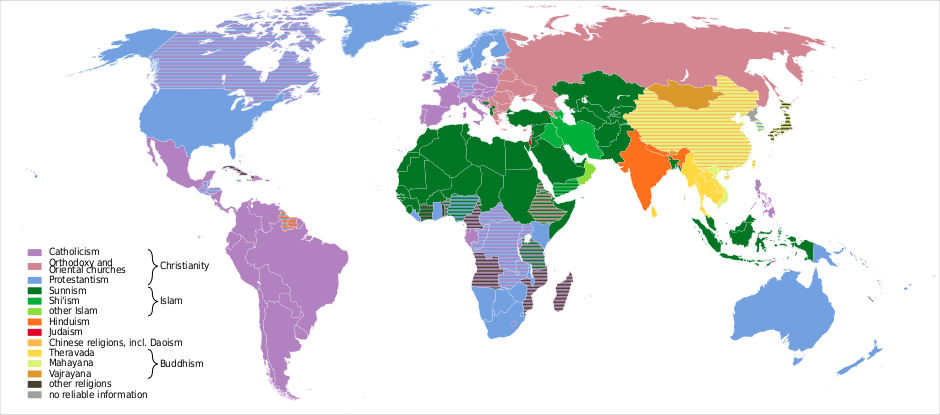It’s a common misconception that you need to have studied Religious Studies or Philosophy at A-Level in order to take a degree in Theology and Religion at university. In this new blog series, academic staff from the Department of Theology and Religion at the University of Exeter encourage A-Level students of other subjects to consider TRS. In this post, Prof David Horrell, whose first degree was in Geography, asks, “Why should A-Level Geography students consider Theology and Religion at university?”
During one of our family debates over an evening meal recently, we were discussing the relative merits of studying Geography or History (one of my teenage children prefers Geography, the other History). “History’s all done”, one said. “But Geography’s all over the place”, was the response. And, in a sense, it is, since what basically gives Geography its focus as a discipline is the study of how things are distributed over space. That includes such things as the movements of people and goods in international trade, the complex flows of resources between countries, the ways in which climate change will impact differently on different places and the people in them, the differential health outcomes of those who live in diverse locations, urban and rural, and so on.
Study any of these complex spatial interactions and you will quickly bump up against questions of ethics and the impact of religion in the modern world. What are the impacts of multinational corporations in various countries, and do consumers in comparatively richer countries benefit from the exploitation of manual workers in comparatively poorer countries? What kind of rules of trade, taxation, and labour rights would help make these systems just and fair – and who defines what counts as fair? How far are geopolitical conflicts and international disputes driven or exacerbated by the different religious traditions and affiliations of different nations or peoples?
The study of Theology and Religion offers the opportunity to understand and reflect on some of the issues that are fundamental to these contemporary challenges. For example, at the University of Exeter, our first year Theology and Religion students learn about some of the ethical traditions that inform ideas about justice and fairness – and put these into practice by studying something like the fashion industry, and the international movements that take place to bring us the garments we wear.
In studies on blasphemy and offence in Christianity, Islam, and Judaism, students have the opportunity to consider how and why contemporary societies treat certain things as sacred, how this changes over time, and how religious and secular bodies clash over such matters. Studying postcolonial theology, to take another example, helps students to see how people from previously colonized countries articulate distinctive perspectives on the world – perspectives from the oppressed and exploited, on the “underside” of empire.
In modules on the Bible, as well as learning about ancient languages, texts, and historical contexts, students come to understand how the Bible continues to be regarded as sacred text and sacred object, how its interpretation continues to be visible and influential even in an increasingly secular country like Britain, how it shapes our views of abled and disabled, and so on. In modules on religious art and architecture, students explore concepts of sacred space and the impact of human activity on urban and rural landscapes.
Each discipline brings its own kind of contribution to understanding the major challenges of the contemporary world. Indeed, if I were trying to resolve our mealtime debate, I’d insist that both History and Geography, time and space, past and present, are crucial if we are to understand the way the world is today. An equally crucial part of understanding our world is to know about the religious traditions that shape ethical decisions, political perspectives, international conflicts, and personal morality.
Studying Theology and Religion – with the ethical and philosophical traditions included under that umbrella – equips graduates with a deep understanding of where ethical traditions come from, how scriptures and religious traditions shape convictions about right and wrong, and about the value and status of the human in the world. This range of skills can be put to excellent use in a wide range of jobs, and graduates in Theology and Religion can make a distinctive contribution, especially in a world where sensitive, informed, and critical understanding of religion is all too rare.






